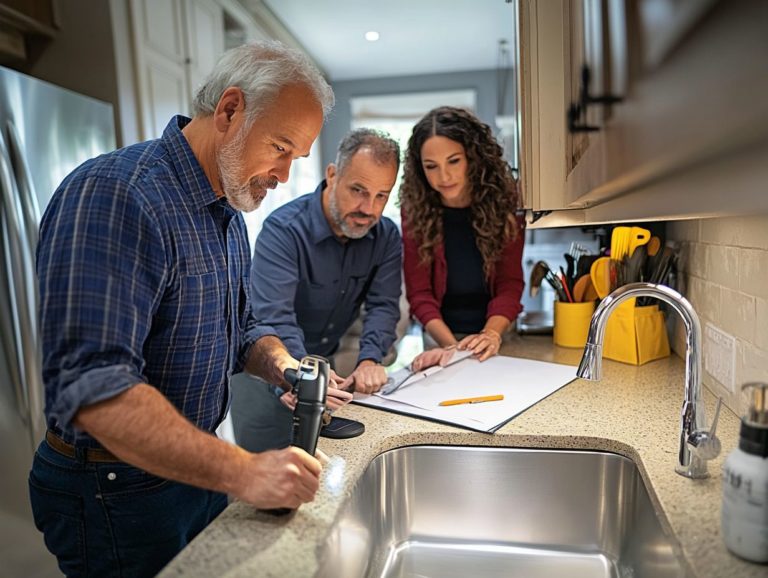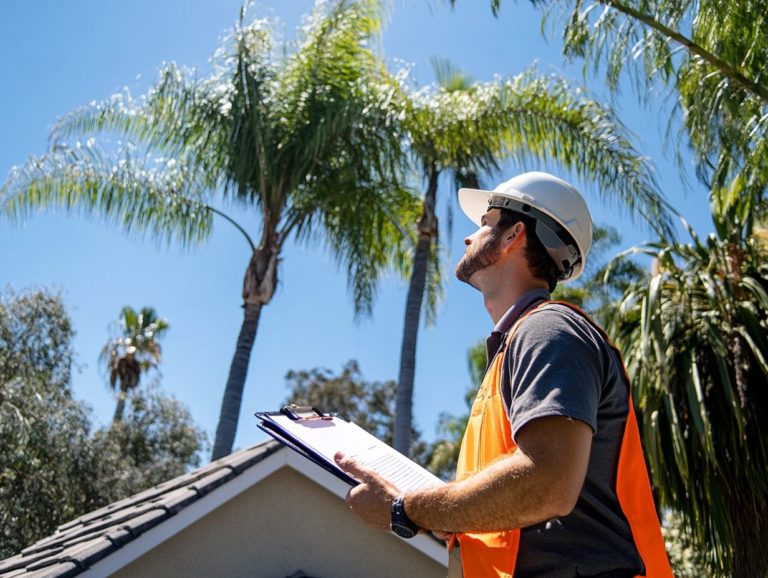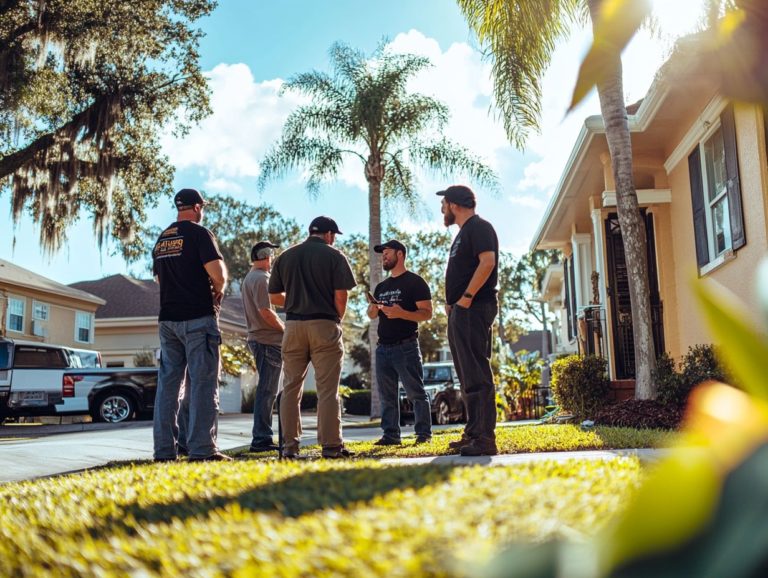Understanding the Home Inspection Process for Buyers
Buying a home is one of the most significant investments you will ever make. It s crucial to ensure that this investment is secure.
A home inspection is an essential part of this journey. It uncovers potential issues that could influence your decision. This article will explain what inspectors assess and how to interpret their findings.
By the end, you will be ready to navigate negotiations and choose a trustworthy inspector. This ensures that your dream home doesn t come with unexpected surprises.
Contents
- Key Takeaways:
- What is a Home Inspection?
- Why is a Home Inspection Important for Buyers?
- What to Expect During a Home Inspection
- What Do Home Inspectors Look For?
- Interpreting the Home Inspection Report
- Negotiating Repairs or Price Adjustments
- Tips for Choosing a Reliable Home Inspector
- Home Inspection FAQs
- Final Thoughts and Recommendations
- Frequently Asked Questions
Key Takeaways:

- A home inspection is a crucial step for buyers in the home buying process.
- It provides a thorough evaluation of a property’s condition and potential risks.
- Understanding the home inspection report is essential for making informed decisions.
- Choosing a reliable home inspector requires careful consideration and the right questions.
What is a Home Inspection?
A home inspection is an important step in your home purchase journey. It assesses the property’s condition and uncovers any potential issues before finalizing the real estate contract. To better prepare, consider reviewing understanding the home inspection process.
This inspection is conducted by a certified inspector. It involves a comprehensive visual examination of key aspects of the home, including the building’s parts, systems like HVAC, plumbing, electrical, and overall maintenance needs.
In areas like Westchester, Putnam, and Dutchess counties in New York and Connecticut, professional home inspections are invaluable. They help you make informed decisions, ensuring you re aware of any hidden defects or safety concerns that could affect your investment.
Definition and Purpose
The purpose of a home inspection is to deliver a comprehensive property evaluation. This helps you make informed decisions about your potential investment.
A thorough buyer inspection highlights immediate safety concerns that could jeopardize future residents. It also points out necessary maintenance needs, helping you understand the home inspection process and the long-term implications of your prospective purchase.
This assessment helps you negotiate repairs and ensures you feel confident in your decision. By uncovering hidden issues, these inspections play a vital role in shaping your final choice.
Why is a Home Inspection Important for Buyers?
A home inspection is vital for every buyer. It serves as an essential assessment of the property’s current condition and is a pivotal part of your emotional journey toward making such a significant investment. Understanding the home inspection process can help ensure you make an informed decision.
By identifying repair needs and potential risks early on, you can better evaluate whether the property meets your expectations.
With a precise inspection report, you gain valuable leverage in negotiations with the seller. This can influence the inspection contingency and potentially lead to significant financial savings, whether through reduced repair costs or price adjustments.
Benefits and Potential Risks
Home inspections offer numerous advantages. They allow you to uncover potential risks while deepening your understanding of the property’s overall condition. They also provide crucial insights into seller disclosures.
Consider this: a comprehensive inspection can uncover hidden defects that might not be immediately apparent, such as structural problems or outdated electrical systems. This information enables you to make informed decisions and prevents unexpected repair costs later on.
The peace of mind that comes from knowing the true condition of a home allows you to proceed confidently. If defects are found, you can negotiate repairs or adjust the purchase price accordingly.
However, forgoing a home inspection can expose you to significant risks. This could lead to financial strain and the stress of unexpected repairs soon after moving in.
Don’t risk your future get an inspection!
What to Expect During a Home Inspection
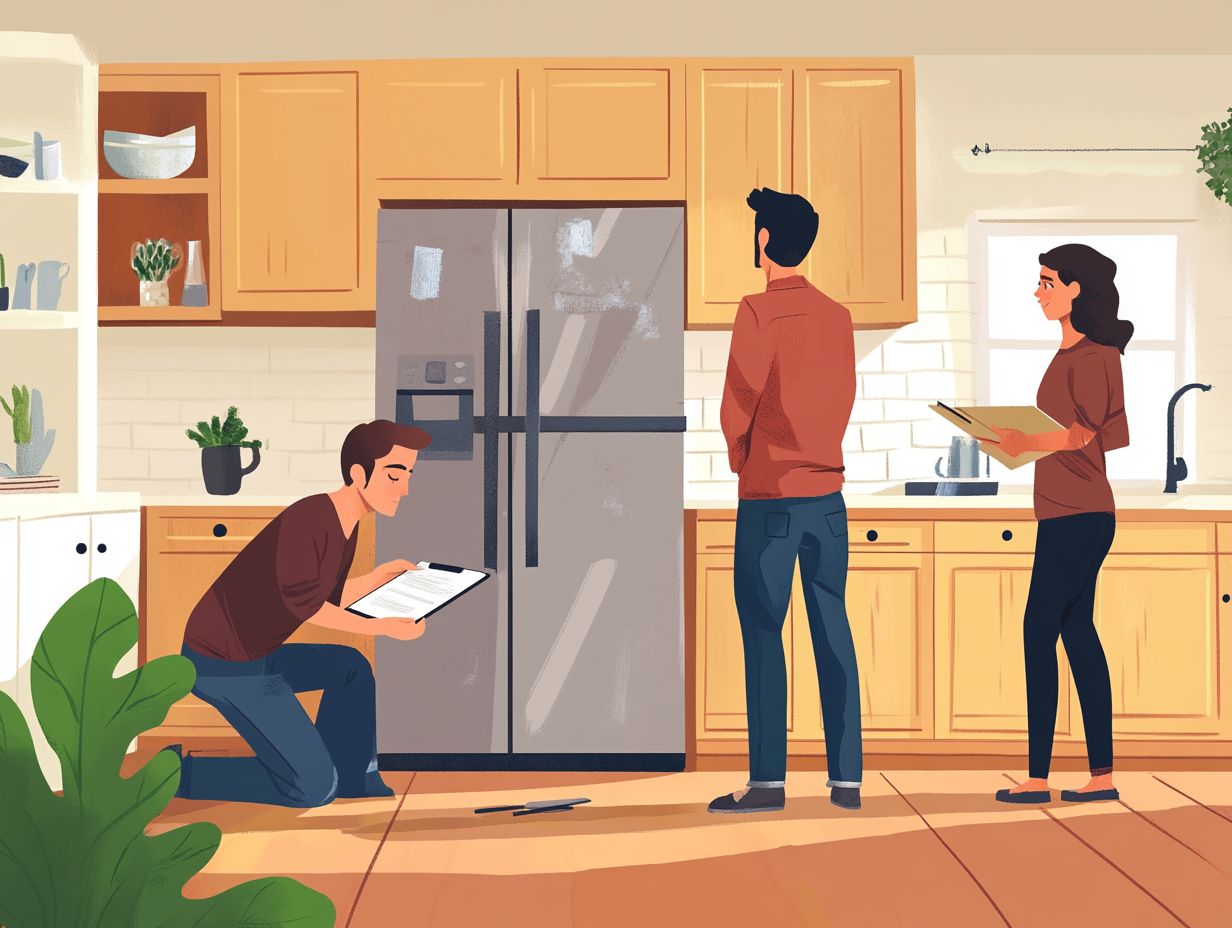
During a home inspection, you can anticipate a thorough evaluation of the property, usually performed by a certified inspector. This process typically takes a few hours, depending on the complexity of the home systems and the size of the property. To gain more insights, consider understanding the home inspection report which can help you interpret the findings.
The inspection day presents you with a unique chance to witness the process firsthand, granting you insights into the condition of key elements like structural components, internal plumbing, and any safety concerns that may emerge.
By preparing effectively for the inspection, perhaps by having a home inspection checklist on hand, you can truly maximize this vital phase of your home-buying journey, enhancing your understanding of the process of home inspections.
What Do Home Inspectors Look For?
As you engage a home inspector, you’ll find they concentrate on a variety of essential elements during a property evaluation. They carefully check common inspection areas, such as the roof, foundation, and internal plumbing, looking for any signs of defects or issues that could impact the property’s value and safety.
A professional home inspector employs a step-by-step process to assess structural components, heating, ventilation, and air conditioning (HVAC) systems, electrical systems, and even hidden flaws that might elude the untrained eye. Understanding the need for home inspections provides you with a comprehensive evaluation of any necessary repairs, enabling you to factor these considerations into your future homeownership plans.
Common Areas of Inspection
During a home evaluation, you ll want to pay close attention to common areas of inspection, particularly critical systems like HVAC, plumbing, electrical systems, and overall structural integrity.
Inspectors will typically delve into the HVAC systems, checking for proper operation and maintenance history, since neglecting these can lead to health issues. Plumbing inspections will focus on leaks, water pressure, and drainage to prevent potential damage or mold growth.
Regarding electrical systems, they ll scrutinize for outdated wiring or faulty circuits, which can pose serious fire risks. The overall structural integrity, including the foundation and roofing, will be assessed to identify potential problems that could impact the property s longevity and preserve its value.
Interpreting the Home Inspection Report
Interpreting the home inspection report is crucial for you as a buyer after the inspection. This document summarizes the findings and provides essential recommendations regarding necessary repairs and their associated costs. Understanding the importance of home inspections through a detailed inspection report not only illuminates the physical condition of the property but also acts as an important tool during negotiations, shaping your decisions throughout the home purchase process.
By grasping the nuances of the report, you can effectively address any identified issues and strategically plan your negotiation approach with the sellers.
Negotiating Repairs or Price Adjustments
Negotiating repairs or price adjustments after an inspection can be a crucial turning point for you as a buyer. This is your chance to negotiate repairs or price adjustments that could save you money and protect your investment, particularly when the inspection report reveals issues that could notably impact your investment.
It s essential to leverage the insights from your inspection contingency strategically in discussions with the seller, addressing any concerns highlighted in the report. Understanding seller disclosure can enhance your negotiating position, potentially leading to concessions that reduce your closing costs or ensure that necessary repairs are completed before you finalize the deal.
Tips for Choosing a Reliable Home Inspector
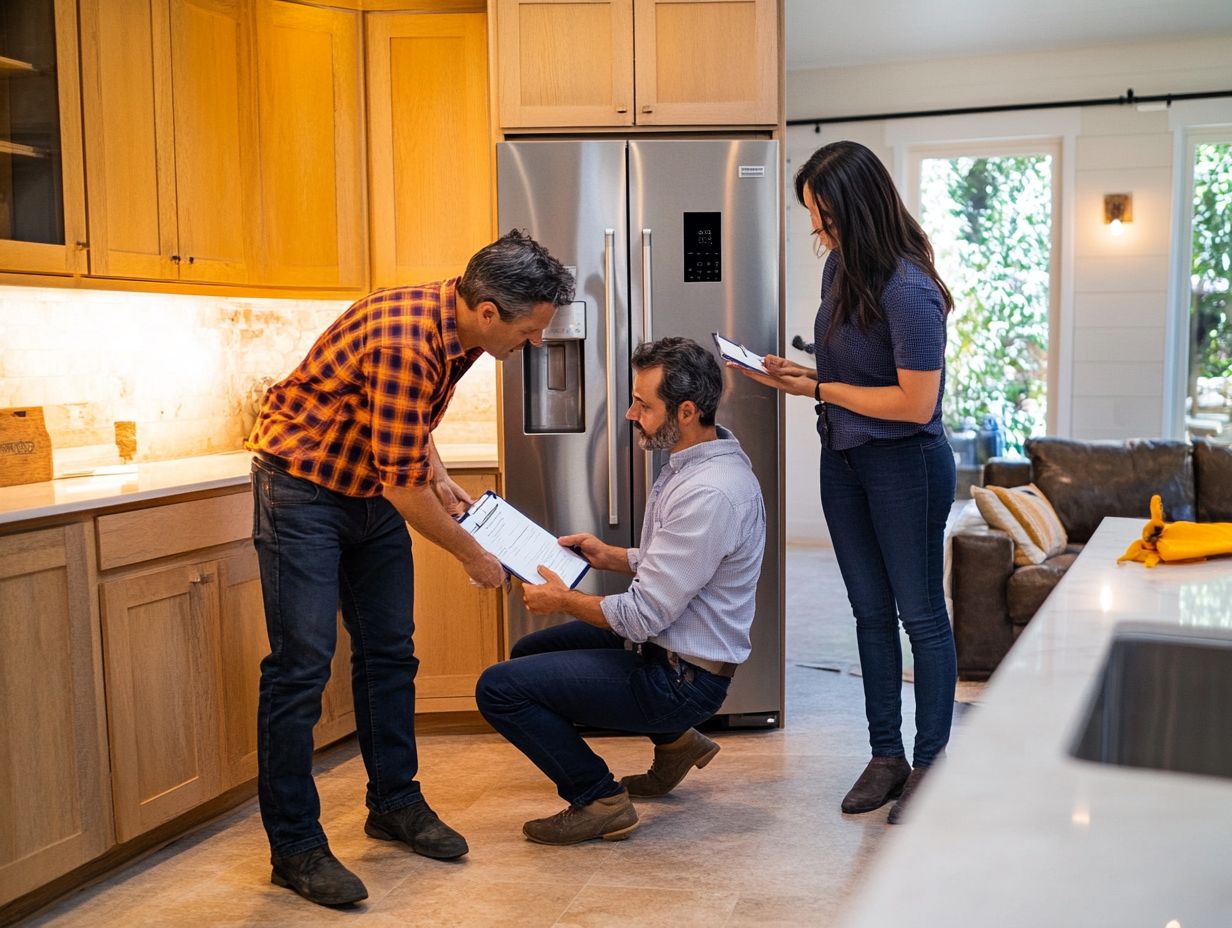
Selecting a reliable home inspector is essential for both first-time homebuyers and seasoned investors, as the quality of the inspection can profoundly influence your buying decisions. Understanding the home inspection timeline can also help you make informed choices throughout the process.
When choosing a certified inspector, consider their professional standing, experience, and commitment to industry standards to ensure they can perform comprehensive property evaluations.
Furthermore, seeking out reviews and recommendations from real estate agents or past clients can offer invaluable insights into the inspector’s reputation and dependability. Making an informed choice here can enable you in your property journey.
Factors to Consider and Questions to Ask
Choosing a home inspector? Consider key factors and prepare specific questions. This ensures you find a qualified expert.
Ask about their experience and the types of properties they handle. Certifications show their commitment to high standards.
Reviews from past clients reveal their reliability and communication style.
Home Inspection FAQs
Home inspection FAQs provide insightful answers to common questions and concerns you may have about the inspection process, the various home systems involved, and the potential costs associated with a home inspection.
Final Thoughts and Recommendations
Final thoughts on home inspections highlight the need for careful checks to protect your investment and ensure a smooth transition into homeownership.
A home represents one of your most significant investments, so approach inspections with a discerning eye and an informed mindset.
This process uncovers potential safety hazards and maintenance issues. It also provides valuable insights into the property s overall condition.
When searching for a qualified inspector, prioritize those with stellar reviews and relevant certifications.
Once you receive the inspection reports, take the time to carefully review the findings.
This preparation empowers you to tackle repairs confidently and plan for long-term upkeep, granting you the peace of mind you deserve.
Creating a maintenance plan based on the inspector’s recommendations can help you sidestep costly repairs in the future.
By being proactive, you enhance your buying experience and protect the value of your investment.
Frequently Asked Questions
What is a home inspection and why is it important for buyers?
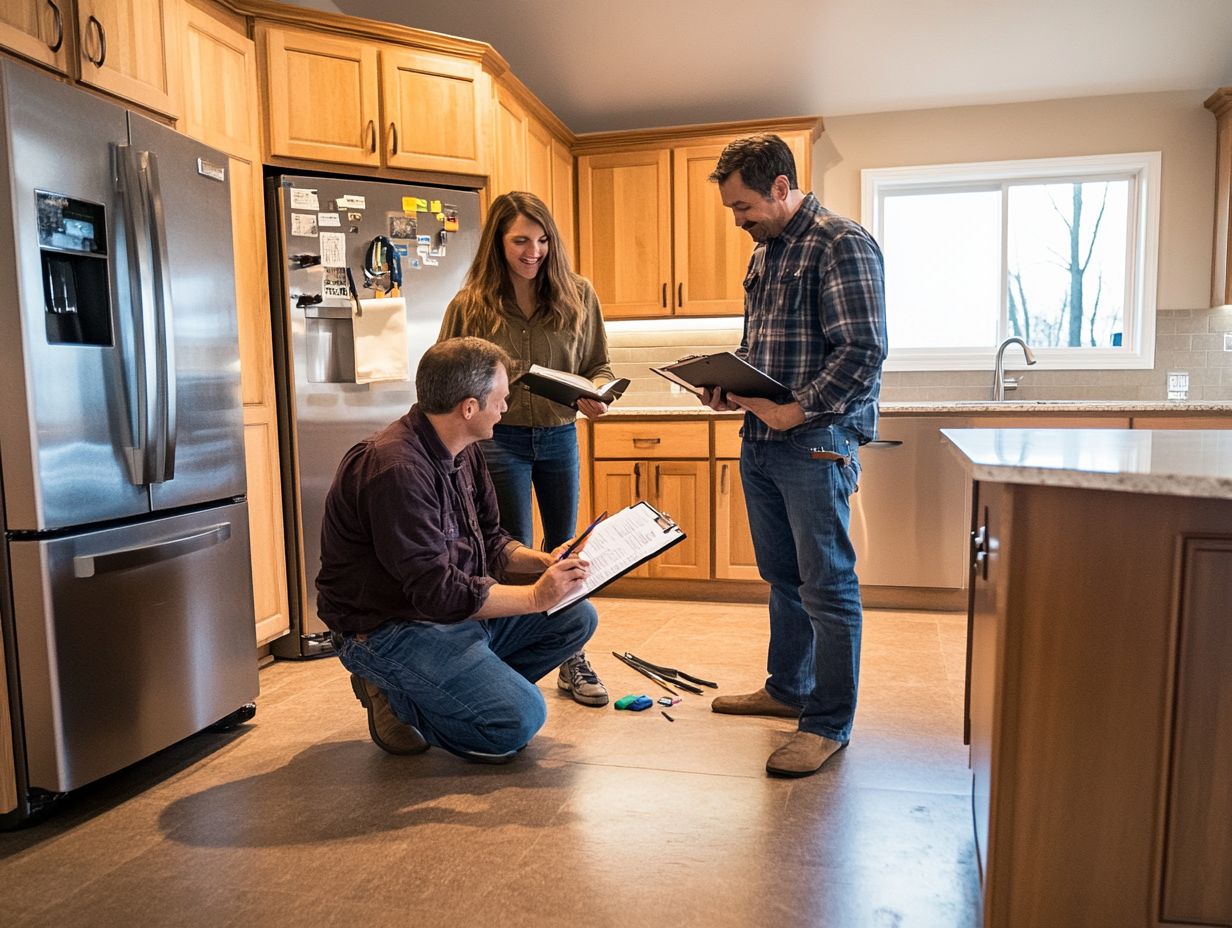
A home inspection is a thorough evaluation of a property’s physical condition, including the structure, systems, and components. Understanding the home inspection process for sellers is important for buyers because it allows them to understand the true condition of the home and identify any potential issues or repairs that may need to be addressed before making a purchase.
Who typically pays for the home inspection?
In most cases, the buyer is responsible for paying for the home inspection. However, this can vary depending on the negotiation between the buyer and seller.
What does a home inspector look for during the inspection?
A home inspector will examine the interior and exterior of the property, including the foundation, roof, electrical systems, plumbing, HVAC (Heating, Ventilation, and Air Conditioning), and more. They will also look for any safety hazards or code violations.
How long does a home inspection typically take?
The length of a home inspection can vary depending on the size and condition of the property. However, most inspections take between 2-4 hours.
Can a buyer attend the home inspection?
Yes, it is highly recommended for buyers to attend the home inspection. This allows them to ask any questions and see first-hand any potential issues that may arise.
What happens if a home inspection reveals issues?
If a home inspection reveals issues, the buyer and seller can negotiate repairs, credits, or a reduced price. The buyer also has the option to back out of the sale if the issues are too significant.


